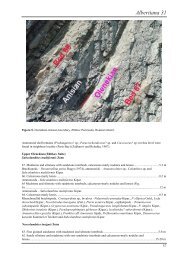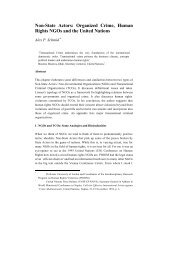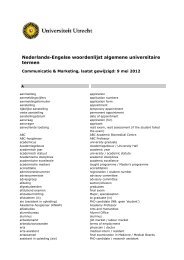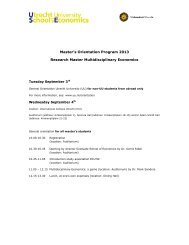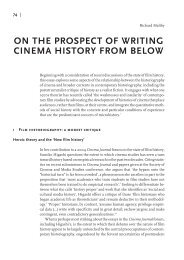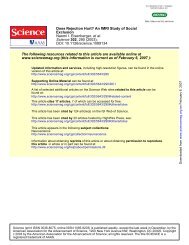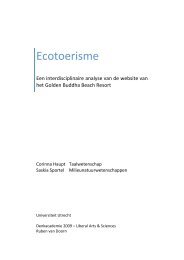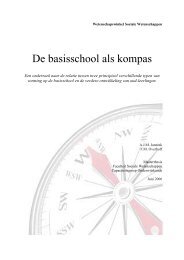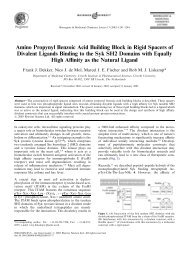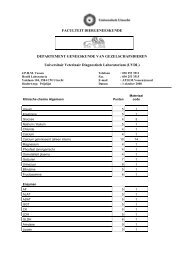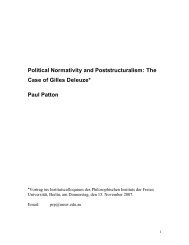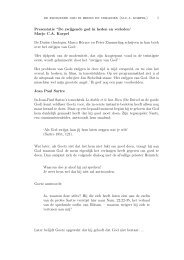Review of the Research Institute for History and - Universiteit Utrecht
Review of the Research Institute for History and - Universiteit Utrecht
Review of the Research Institute for History and - Universiteit Utrecht
Create successful ePaper yourself
Turn your PDF publications into a flip-book with our unique Google optimized e-Paper software.
B 10. Overview <strong>of</strong> <strong>the</strong> results<br />
Table B.8 Aggregated OGC output, 1997-2004<br />
1997 1998 1999 2000 2001 2002 2003 2004 Total<br />
Academic publications in journals 253 280 244 173 228 199 219 164 1760<br />
Academic publications book chapters 255 244 211 155 199 194 153 173 1584<br />
Monographs <strong>and</strong> editing 63 89 107 90 99 75 84 74 681<br />
PhD-<strong>the</strong>ses 15 20 27 19 25 14 21 10 151<br />
Pr<strong>of</strong>essional publications <strong>and</strong> products 176 227 192 161 171 156 142 144 1369<br />
Publications constitute <strong>the</strong> main output <strong>of</strong> research carried out at OGC. In <strong>the</strong> period under review 5,547<br />
academic <strong>and</strong> pr<strong>of</strong>essional publications <strong>and</strong> dissertation have been published. On average 8.9 academic publications<br />
were produced per fte tenured faculty (i.e. <strong>the</strong> number <strong>of</strong> academic publications divided by research<br />
input <strong>of</strong> tenured faculty). Of <strong>the</strong> academic publications 40% were international, i.e. published in ano<strong>the</strong>r language<br />
than Dutch.<br />
In <strong>the</strong> arts <strong>and</strong> humanities, a more sophisticated assessment, o<strong>the</strong>r than by pure numbers, remains<br />
extremely diffi cult. Reliable measurement by citation or impact, as is customary in <strong>the</strong> natural sciences, is<br />
not available. There is no consensus about <strong>the</strong> ranking <strong>of</strong> journals. The European Science Foundation is<br />
trying to develop such a ranking system, <strong>and</strong> this will inevitably privilege international over national media.<br />
This is a problem ins<strong>of</strong>ar as cultural disciplines are by defi nition culture-bound: national journals <strong>for</strong> Literary<br />
Studies <strong>and</strong> <strong>History</strong> are not by defi nition <strong>of</strong> lesser quality than international media. To a high degree, <strong>the</strong><br />
paradigmatic character <strong>of</strong> a discipline, or its absence, determines not only <strong>the</strong> international orientation, but<br />
also <strong>the</strong> accessibility <strong>of</strong> <strong>the</strong> media in that fi eld. The cultural sciences are almost by defi ntion less paradigmatic<br />
than, <strong>for</strong> instance, Chomskyan linguistics. Journals <strong>of</strong> Dutch Studies are almost impossible to classify along<br />
<strong>the</strong> national-international axis. The Tijdschrift van de Koninklijke vereniging voor Nederl<strong>and</strong>se Muziekgeschiedenis<br />
can be considered as an international journal. Prestigious international journals as <strong>the</strong> Economic <strong>History</strong><br />
<strong>Review</strong> <strong>and</strong> Past <strong>and</strong> Present turn out to none<strong>the</strong>less have a strong preference <strong>for</strong> British <strong>and</strong> Commonwealth<br />
topics. Attempts at ranking also tend to over-emphasize <strong>the</strong> importance <strong>of</strong> journals to <strong>the</strong> detriment <strong>of</strong> books,<br />
which remain very important <strong>for</strong> <strong>the</strong> humanities. And so are <strong>the</strong> channels <strong>of</strong> communication with <strong>the</strong> nonacademic<br />
audience, which constitutes a signifi cant life-line <strong>for</strong> <strong>the</strong> humanities. This is not to say that international<br />
publishing, in competitive journals <strong>and</strong> with prestigious international academic presses is unimportant.<br />
OGC highlights such achievements, <strong>for</strong> instance on its web-site, <strong>and</strong> keeps track <strong>of</strong> all international publications.<br />
Table B.7, demonstrates that during <strong>the</strong> period under review <strong>the</strong> percentage <strong>of</strong> international publications<br />
fi rst steadily increased, to decrease from 2002 on again.<br />
Table B.9 Percentage international academic publications OGC, 1997-2004<br />
1997 1998 1999 2000 2001 2002 2003 2004<br />
not available 37,68% 49,02% 50,84% 52,17% 50,11% 42,44% 32,37%<br />
OGC <strong>Research</strong> <strong>Institute</strong> <strong>for</strong> <strong>History</strong> <strong>and</strong> Culture<br />
380





